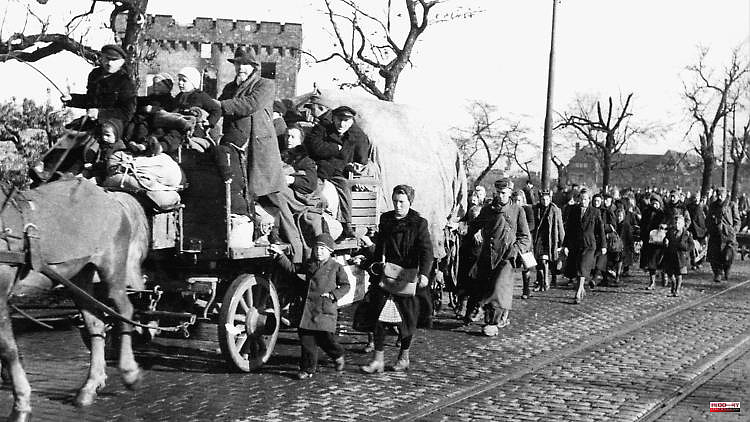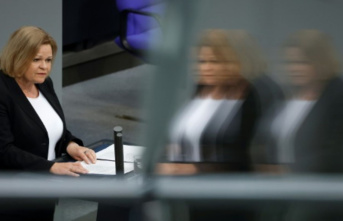The war in Ukraine is raging just a two-hour flight from Germany. This also brings back painful memories for many people in Germany. They were children when they experienced air raid warnings, escape and expulsion.
The caller is very old, at 16 he had to go into World War II. Almost 80 years later, a war is raging in Ukraine that brings back memories for him. On the Silbernetz senior phone line, the man bursts out that he committed terrible crimes against civilians. "It all came up again," says Silbernetz founder Elke Schilling.
The hotline against loneliness in old age saw an increase in calls during the war. There are also old women whose mothers had been raped, something that was kept secret in Germany for a long time. It was a taboo subject in post-war families, which was also hidden behind the sentence "If the Russians come, then run".
Today, some of the pain caused by Germany's war guilt is resurfacing at the atrocities and massacres in Ukraine. "It brings back strong memories, that's completely clear," says bestselling author Sabine Bode. She had contacts with hundreds of contemporary witnesses for her groundbreaking books "War Children" and "War Grandchildren". In it, Bode uncovered the effects of childhood war trauma decades later and across generations. She says of the war children born between 1930 and 1945: "These years were not comforted for decades."
With regard to the Ukraine, Bode says: "Apart from the Balkan war, a war has never been so close, especially not with so many pictures." From her point of view, the events, which are only a two-hour flight away, can have the effect of an earthquake: "Every family with a background in displacement causes unrest." She thinks it is conceivable that German families will not only tell the "clogged anecdotes" that describe, for example, the escape from East Prussia in 1945 as a childish adventure, but also things that have never been heard before.
In 2015, when the many refugees from the Middle East came, there were sharply divided groups in the families: some who really wanted to help, others who distanced themselves, according to the motto: "Nobody helped us back then either." In fact, there was little culture of welcome in the post-war years. At that time, Germany, which had been severely damaged and reduced in size by the war, had to take in a huge number of refugees and displaced persons: as of 1950, there were twelve million, which compensated for the great loss of population during the war, according to the historian Michael Schwartz from the Institute for Contemporary History in Munich- Berlin describes.
"Initially, German post-war society - despite corresponding appeals from politicians - was not very much characterized by solidarity in everyday life, but rather by rejection of the refugees through social and cultural conflicts." According to Schwartz, refugees were seen as a social burden. They needed housing, jobs, and financial support—and all of that was in short supply. They were rejected, insulted as "Polacks". "Materially, the refugees were at the bottom of the social hierarchy," says Schwartz.
A drastic example of the atmosphere at that time can be found in the book "Refugee Land Schleswig-Holstein": In March 1945, a refugee girl and her mother were quartered in the bedroom of a family in Heide. The daughter of the house came into the room to see what was going on in the street. When she saw one of the transports with refugees, she cried: "O-hau-e-hau-e-ha! Soon there will be more refugees than people in Heide!"
The historian and author Miriam Gebhardt ("When the soldiers came") observed how this generation was shaped: "The children who first lived in camps and then often in new housing estates among their own kind grew up in a time capsule with the tearful stories their parents from their old homeland. They were encouraged to work hard and be active early on, because they were supposed to make up for the 'blemish' of their origins and do some good for the reconstruction of the country." As with the rest of the population, children's needs for tenderness and play tended to be neglected in this climate. "They often experienced their parents as careworn and emotionally inaccessible," says Gebhardt, who is dedicated to "Our Post-War Parents" in a book that will be published in May.
What do today's images of war trigger in older Germans? "Because Russia is the aggressor, the old fear of 'the Russians' gets new nourishment," says Gebhardt. "This had been extremely pronounced even before the capitulation on May 8, 1945, thanks to Joseph Goebbels' propaganda, and what then happened during the flight and during the occupation, think of the mass rapes, only seemed to confirm the fears. The children and Grandchildren were often only told about it in hints, but that only made the images in the imagination worse."
For Gebhardt, as at the beginning of 2015, the renewed willingness to help during the Ukraine war is related to the collective memory of the Germans of their own escape experiences. "And in contrast to 2015, this time it's mainly women and children who come. That encourages identification even more, because on the refugee treks in 1945 it was primarily women, children and the elderly."
One thing is certain: Ukraine is an issue that will have a profound impact on German society in the spring of 2022, probably more so than other wars around the world, for many reasons. The memories of the Second World War remain in old age. "Bombs, they always came with bombs, the planes," recalls a 92-year-old resident of a nursing home in Thuringia in an MDR report. As a 15-year-old girl, she always dropped everything when there was an air-raid alert.
The nationwide seniors' phone Silbernetz, which was founded in Berlin, also senses the mood among the elderly. The number of calls there rose from around 150 at Christmas to 200 a day. According to founder Elke Schilling, older people are not only worried about the war, but also about the rising costs. Some help themselves with gallows humor: A caller said she still had toilet paper with Easter bunnies from two years ago, when the pandemic began. And something else helps, as Schilling says: When the weather is nice, the number of calls decreases. Being outside is like a salvation.
6












